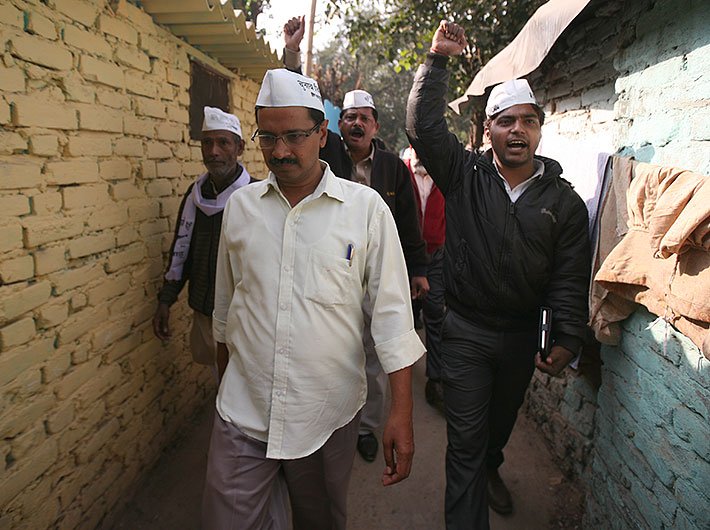The decision to shut two liquor vends in west Delhi following a public vote is the result of a direct democracy being encouraged by Arvind Kejriwal led Aam Aadmi Party (AAP) government.
Kejriwal on Sunday said that any complaints related to closure of liquor vends in the city will be discussed in ‘janta sabhas’ and the government will not hesitate to shut them down if the interest of the people is at stake.
Direct democracy is a form of democracy in which people directly decide on policy initiatives.
Noted lawyer Prashant Bhushan, who was once with the AAP, had told the Economic Times that it's "about time for India to institutionalise participatory governance where democratic structures are created to make laws based on the will of the people".
In fact, in an article “Our democracy must empower voters” written for The Hindu on July 21, 2012, Prashant Bhushan and Atishi Marlena, an AAP leader, said that India is a representative democracy, where people select their representatives once in five years to make laws and policies on their behalf. Limiting the participation of the people merely to voting once in five years has significantly reduced the responsiveness of the representatives to the people.
“Representative democracies around the world have searched for solutions to this structural flaw. One innovative solution tried in numerous countries is the Referendum (R) and the Initiative (I). These are instruments whereby some decisions of policy and law-making are ‘referred’ to a direct vote by the electorate, rather than solely being decided by their representatives. They provide a formal, institutional channel for the voice of the citizens, if they feel that their representatives are not adequately representing them.
“The primary value of I&R is to align legislative behaviour closer to public opinion. The mere presence of I&R, even when it is not used, makes the legislature more aligned to public opinion, since they know that citizens have the I&R channel to “trump” them. For example, in Uruguay in 2002, privatisation of the state-owned mobile phone operator was challenged by citizens. They collected the required number of signatures for a citizen-initiated Referendum. Before the voting happened, the government repealed the law and no referendum had to be held,” they wrote.
What they wrote in 2012 was already in practice in Europe, with the European Citizens’ Initiative directly involving the people in policy matters.
The European citizens' initiative is an invitation to the European Commission to propose legislation on matters where the EU has competence to legislate. A citizens' initiative has to be backed by at least one million EU citizens, coming from at least 7 out of the 28 member states. A minimum number of signatories is required in each of those 7 member states.The rules and procedures governing the citizens' initiative are set out in an EU Regulation adopted by the European Parliament and the Council of the European Union in February 2011, said europa.eu.
Direct democracy, as we understand it, refers to people making policy and law decisions in person, without going through representatives and legislatures.
The New England Town meeting is a good example of how it works.
The Co-Intelligence Unit said that more recent direct democracy proposals tend to focus on voting schemes that would allow widespread, virtually continual voting by millions of citizens on whatever proposals surfaced. While useful in building up a buffet of voting methodologies for possible use in other contexts, the lack of organized public deliberation about the issues in question makes such proposals look more like opinion polls than exercises of citizenship.
An approach to direct democracy -- the "initiative process" adapted by a number of states -- allows anyone to propose a law which, if they can get enough of their fellow citizens to co-sponsor it (usually by signing petitions), can be voted on by the entire electorate in the next election, it added.
Interestingly, the New England Town meeting, which dates back to the 17th century, is not the oldest instance of direct democracy at play.
Law making by assembled adult males dates to the age of Pericles in Greece in the fifth century B.C., said a website.
What was in practice in the 5th century BC and was being effectively used in New England in the 17th century has now been put to use in Delhi in the 21st century.
Perhaps, it is time to flip through the pages of history books to better know the modes of effective governance which is truly participatory in nature.
